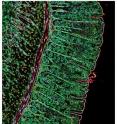Border patrol: Immune cells protect body from invaders, according to Penn study
Related images
(click to enlarge)
So-called barrier sites -- the skin, gut, lung – limit the inner body's exposure to allergens, pollutants, viruses, bacteria, and parasites. Understanding how the immune system works in these external surfaces has implications for understanding such inflammatory diseases as asthma, psoriasis, IBD, and food allergies, all of which occur at the body's barriers. David Artis, PhD, professor of Microbiology and Gregory F. Sonnenberg, a predoctoral fellow in the Artis lab, have identified an immune cell population that acts as the body's border patrol with the outside world. They discovered that these lymphoid tissue inducer cells maintain immunity in the intestine of mice. The research appeared in the most recent online issue of Immunity.
Following infection by Citrobacter rodentium -- a model of human E. coli infection in the gut – this cell population was the dominant source of IL-22, a molecule that helps in the immune response during the early phases of infection. When the inducer cells were eliminated from the intestine of the experimental mice, immunity was impaired, affecting the production of anti-microbial proteins required to fight infection. The mice eventually died.
This discovery could also represent a new line of research for HIV/AIDS, says Artis, since there is a breakdown of barrier immunity in the gut (a reservoir for HIV) that can lead to full blown AIDS. Therapeutics to target such immune cells could be an important new way to combat AIDS.
Source: University of Pennsylvania School of Medicine
Other sources
- Border patrol: Immune cells protect body from invadersfrom Science DailyMon, 7 Feb 2011, 20:33:51 UTC
- Border patrol: Immune cells protect body from invaders, according to Penn studyfrom Science BlogMon, 7 Feb 2011, 19:05:41 UTC
- Immune cells protect body from invadersfrom PhysorgMon, 7 Feb 2011, 17:01:55 UTC
